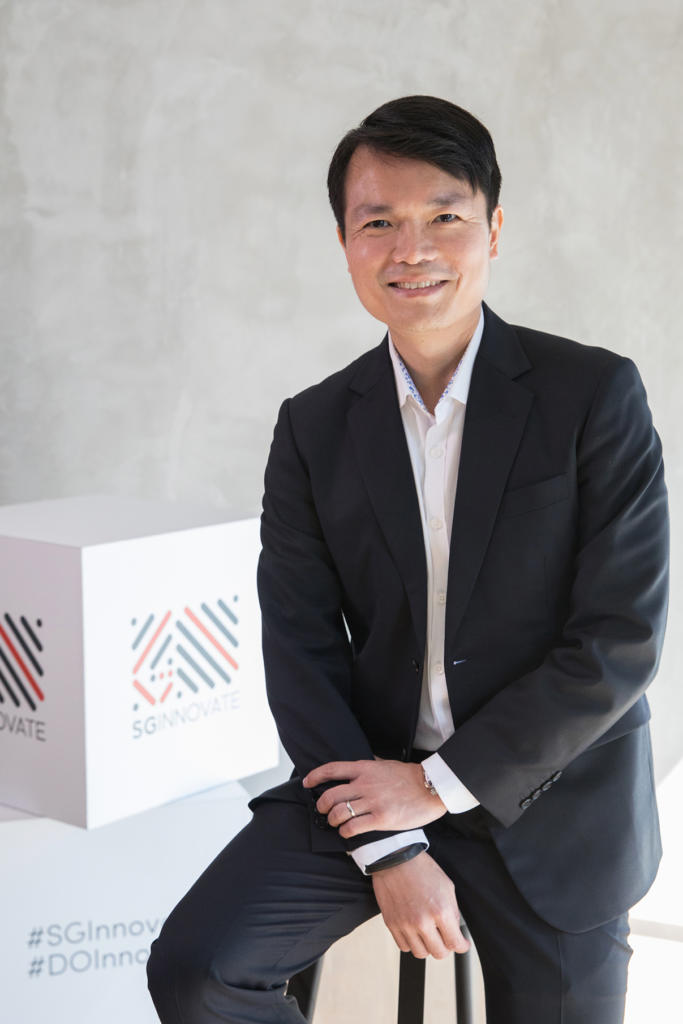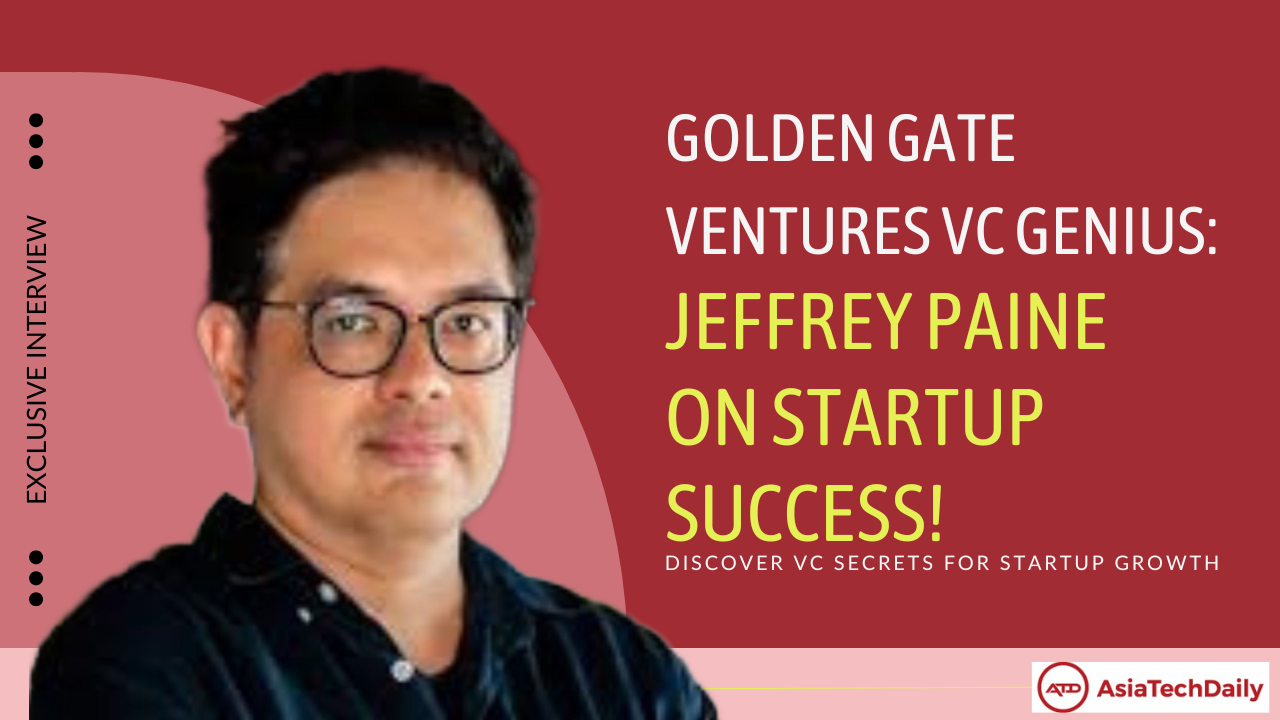AsiaTechDaily – Asia's Leading Tech and Startup Media Platform

Hsien-Hui Tong, SGInnovate – A Well-Known Name Backing Deep Technology Startups
Hsien-Hui Tong is a visionary investor backing high potential, high-tech startups that specialize in the area of Autonomous Vehicles, Artificial Intelligence, Blockchain, and MedTech.
Mr. Tong brings with him vast experience and in-depth knowledge in venture capital and business development spaces across Europe, Australia, US, and Singapore. As Head, venture investing at SGInnovate, Mr. Tong oversees investment in startup companies that apply technology to solve specific industry problems. The investment firm has funded more than 50 foreign and local startups from pre-seed to series A since its inception in November 2016. To name a few, the investments have been made in MSLA 3D printing, LIDAR, robotic surgery, Radar, Quantum Technology and many more.
Mr. Tong joined SGInnovate in 2016 and is based out of Singapore. Prior to this, he was working as a Managing Partner, Asia Pacific at Wassax Ventures where he did investment in startups in the following sectors- Virtual/Augmented Reality, Energy storage, and Biotech.
Before joining Wassax Ventures he was CEO at the National University of Singapore Society. He has also served as Vice President at Corporate Express Asia for three years. Before joining Corporate Express Asia he was Director at Nippercraft Ltd. In the early 2000s, Mr. Hsien-Hui Tong co-founded a data mining company, which was later sold to a global bank.
Mr. Tong has graduated from NUS in 1998 with a Bachelor of Engineering degree and has done his schooling from the International School of Geneva. He has been actively involved with the NUSS-National University of Singapore Society.
Read on to know more about Mr. Hsien-Hui Tong and his rich experience.

What background and domain expertise do you have? What made you decide to be an investor?
Hsien-Hui Tong: As the head of Venture Investing at SGInnovate, I oversee all of SGInnovate’s investments efforts, which target high-potential early-stage, deep technology startups in areas such as Artificial Intelligence (AI), Autonomous Vehicles (AVs), MedTech and Quantum Technologies.
Prior to joining SGInnovate, I was Managing Partner, the Asia Pacific for Wassax Ventures and made Series A investments in startups in the energy, VR/AR and biotech sectors. I started and sold my own deep tech business in the early 2000s which gave me some insight into the psyche and challenges of startup founders. This has stood me in good stead when evaluating founders as individuals rather than as technologists.
After experiencing life as a senior manager in a variety of companies in different industries, I felt that it was important to go back to my entrepreneurial roots and help startup founders as a VC who has walked the same path and experienced the cultural and social challenges they may face.
As an investor, what kind of startups have you invested in? How did you find those startups to invest in?
Hsien-Hui Tong: At SGInnovate, our investment philosophy is based on our belief that the world’s most difficult problems can be solved using deep tech, characterized by products or innovations that have scientific research and intellectual property (IP) at its core, difficult to replicate, and has a high barrier-to-entry.
Our mission is to help entrepreneurial scientists build deep tech startups. When we invest overseas, we seek companies with technology that Singapore does not currently have and which are complementary to what we are doing locally.
With our sharp focus on deep technology and the scarcity of global funds that invest in this area, we have built a network of partners within the ranks of the tech transfer offices in top universities across the world, the best global research organizations and venture capital/private equity firms specializing in the deep tech sector.
On average, every quarter, we are forwarded more than 500 proposals from all over the world from which we will conduct detailed due diligence on maybe 10, which results in about 2 or 3 investments.
Our constraints remain our areas of investment focus and as such, we have had to pass on many great companies that do not meet our twin requirements of areas of interest and being complementary to what we are doing in Singapore.
What would be the core factors that help you decide “not” to invest in certain companies?
Hsien-Hui Tong: Rather than approaching this with a ‘what’s the deal-breaker’ mentality, let’s look at what we like instead.
Firstly, for us at SGInnovate, we are mainly focused on deep tech – so while ride-sharing apps and photo apps that allow you to swap your faces are fun, great and potentially good investment, we do not invest in them.
Secondly, aside from the technological dimension, we also look at other aspects of what they are doing. We assess not only the technological feasibility but also the structural challenges of the market, such as regulatory hurdles and laws, as well as cultural barriers which may limit the total market opportunity.
Thirdly, we look at the founders themselves to see if they have the necessary resilience to weather the tough environment a startup founder is bound to face. Founders that come complaining to us the moment they encounter a problem are not likely to be a priority.
What are your KPIs that you use to check on the startups’ growth? It may be diverse in each industry like LTV, CAC, MoM etc. but would be helpful to understand more about your additional investment factors.
Hsien-Hui Tong: In general, milestones are set at the point of investment to ensure that the startup is able to raise its next round of funding. The specific milestones will differ according to each startup and how the startup achieves these milestones will depend very much on the founders. There are also industry-specific milestones. For instance in MedTech, there are standard classifications and regulatory compliance requirements that need to be met before a product can even be sold.
If the company is at an early stage and a Singapore company, we have the resources to help them meet those milestones. Once milestones are met, we can also help to syndicate an investment round. While standard KPIs for software as a service (SaaS) companies are useful, they are less applicable to early-stage deep tech startups whose milestones and metrics relate more to getting a product to market.
For overseas investments, we prefer to invest at a later stage with a strong lead investor who can play a similar role. But while returns are important to us, we look at how such deep tech companies are evolving against the backdrop of a changing global economy. We are focussed on helping grow the Singapore economy with our effort, and our learnings from our overseas investments help to shape our own domestic investment strategies. For instance, quantum technology investment is not new in more mature startup markets like the US, but is nascent in Singapore. Our engagement with partners overseas helped us to understand how to evaluate such startups and when the time was right, to make our first investment locally.
What is the investment range for your organization and in a typical year, how many startups do you invest in? And do S.Korea headquartered startups have a chance to get investment from you or must the startups you look at be headquartered in certain countries?
Hsien-Hui Tong: Our investment figure can vary from small ticket sizes to a relatively significant size – around S$2 million per deal, depending on the funding stage that the company is in. We manage two funds. The first is a Singapore focussed co-investment fund from which we have an average of 20 investments a year. The second is a later stage global fund where we invest on average in about eight companies a year.
We would certainly welcome meeting any South Korea based deep tech startups. Our only challenge is the large number of referrals that come to us. If we can identify a value partner who can send us curated referrals, we would be delighted to make investments in South Korean companies.
Can you list one company that you have passed (rejected) investment before but think you should have invested in that company. If there is any, why do you think you missed that investment opportunity at that point in time?
Hsien-Hui Tong: There are really too many to mention. As VCs, if we focus too much on missed opportunities, we will not be in tune with the evolution of the market. Being a relatively new VC (less than 3 years), there are companies we passed on that subsequently went on to raise funds at higher valuations in uprounds, but none that I know of have actually exited yet and returned funds to their investors.
There are many reasons why we pass on an investment that have nothing to do with the quality of the company. One is obviously that it does not fit our investment mandate. Second, the valuation is too high. Third, the investment terms are unattractive. Fourth could be a timing issue. Sometimes at the point of evaluation, the technology or market is not mature. When it does, the company can sometimes grow very fast by which time the funding round would already be closed.
In your experience, what are the main factors that cause startups to fail after getting investment and from your personal perspective, how can they prevent mistakes in advance?
Hsien-Hui Tong: There are many reasons for this and I am just listing a few more common ones that we have encountered. It is often founder-related.
Many of the founders that we work with come from a researcher/scientist background. Often, the transition from scientist to entrepreneur may prove to be a challenge, as they now find themselves dealing with a whole new corporate business domain and managing investors.
Some founders also feel that once the funds are raised, their job is done and they neglect growing the company and spend more time speaking at conferences without realising that fundraising is honestly the easiest part of the journey.
Founders also sometimes hire quickly with the fresh injection of cash without realizing that they lose a good part of their culture and values by bringing in large numbers of new people.
There are also issues if new shareholders are not aligned with the expectations of the founder and clashes between founders and investors is a sure recipe for failure.
What’s your advice to entrepreneurs who have a chance to meet investors like you? What are the top 3 questions that you always ask founders?
Hsien-Hui Tong: I always ask a few standard questions:
- What problem are you solving?
- How big is this problem (what is the market opportunity)?
- How lucrative is this problem (how much are people willing to pay to solve this)?
You will notice that the top three questions do not mention technology at all. That’s because technology is just an enabler. If those three questions cannot be answered then the best tech in the world can’t help you.
What are your general thoughts about the term “Global” and what do you think are the important factors (criteria) for Korean startups to consider when looking at international expansion?
Hsien-Hui Tong: “Global” should be the endgame for the deep tech startups that we work with. While many of them are Singapore-based, building and developing their products within the country, we urge them to have the ambition to scale and expand regionally and further on the world map. Perhaps the advantage is that we are a small country and startups here have to think global from day one.
A global market is crucial to secure venture investing. VCs look for fast-growing companies. A company can be good with steady growth, but the end game will likely be that it becomes an SME or a generational company (company passed on from founder to son/daughter)
The global market is a brutal one. To be ready for it is to fully understand your competitors and their core strengths and weaknesses. Never underestimate the importance of connections in securing meetings with prospective customers and stakeholders.
Ultimately, I believe that for a company to expand to a new market would be to secure an investor who already operates in that country or who has an office in the countries you are seeking to expand to. Good investors always open doors as it is in their interest to see you expand and grow.
For this reason, while we are not the biggest investor in a round, good companies seeking a foothold in Asia through Singapore are always receptive to us as we can help to open doors in not just Singapore but other parts of Asia.
As you know, our company name is “beSUCCESS”. What’s your definition of the term “success” as an investor or as an individual?
Hsien-Hui Tong: Success is a subjective matter and means different things to me as an individual and me as an investor. As an investor, a good return on the investment is the logical metric of success. As an individual, I feel a deep sense of satisfaction to see a company I invested in do well because of the advice or help we gave them.
What are the one or two things that you would do differently if you could go back to 10 years ago?
Hsien-Hui Tong: Wow, to ask an investor something like that is almost like giving them a blank cheque. I could well say be an early investor in the likes of AirBnB or Uber when valuations were still semi-sane. However I think from a life perspective, I would not do anything differently. Ten years ago, I was the CEO of the NUSS, the largest Singapore alumni club, where I learned the nuts and bolts of the Food and Beverage industry. Every step in my career has been about learning new things and I always look forward and only look back to draw on experiences for future application, rather than regret.
When you have a chance to visit Korea, what are the Korean entrepreneurs and startups you want to meet?
Hsien-Hui Tong: I would certainly welcome meeting Korean entrepreneurs and startups in our industries of focus such as AI, Mobility/AV, Medtech and Quantum Technology. I know that Korea has a solid foundation in science and technology and am sure there are many great companies out there.
You can follow Hsien-Hui Tong here.
Are you looking to secure investment for your startup or a keen startup enthusiast, keep an eye on our interview section.
Follow Asia Tech Daily to know about the innovative startups and how they are revolutionizing the ecosystem.





